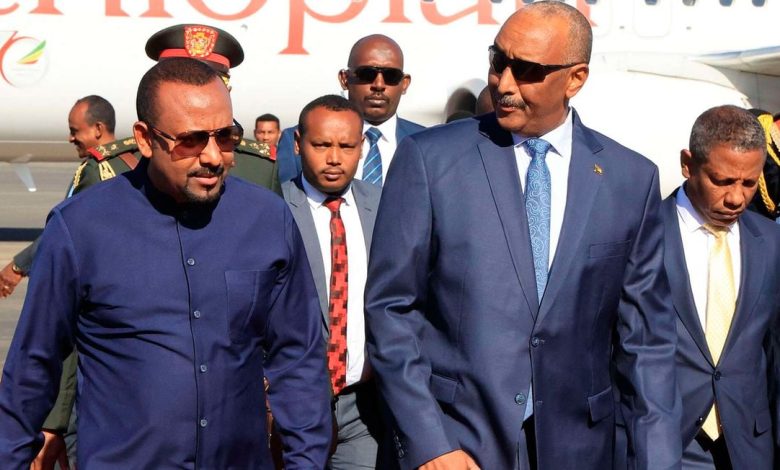Reports
Igad plans December 9 summit on Sudan amid fresh violence

Agencies – Sudan Events
The Intergovernmental Authority on Development (Igad) is set to formally amend its mediation programme on Sudan, which had included the creation of a quartet of countries seeking peace.
The bloc has organised a summit of heads of state and government on December 9 in Djibouti in what sources say is meant to retune the mediation after strong lobbying by Sudanese junta leader Gen Abdel Fattah al-Burhan.
Burhan has recently completed a new round of shuttle diplomacy that saw him visit Nairobi and Addis Ababa, two capitals in the region he had initially avoided. On November 26, Burhan also met with Djibouti President Omar Ismael Guelleh, the Igad chair, and executive secretary Workneh Gebeyehu in Djibouti, and later Eritrean leader Isaias Afwerki in Asmara. Dispatches said they discussed Sudan’s security and humanitarian situation.
Officials familiar with the summit preparations say it will discuss the humanitarian situation in Sudan, where some five million people have been displaced and more than 7,500 killed since the violence broke out in April.
For Burhan, however, the meeting is crucial to reverse some of the earlier decisions Igad had made in June, when it created a quartet of Kenya, Djibouti, Ethiopia and South Sudan to lead the dialogue between warring parties—the Sudan Armed Forces and Rapid Support Forces (RSF).
The junta started criticising Kenya, accusing it of siding with the RSF. Burhan would later tone down, and in November toured Nairobi and met with President William Ruto. The two leaders agreed to support the Jeddah talks under the US, Saudi Arabia and Igad, eliminating the possibility of parallel processes.
In Igad tradition, however, a decision of the summit can only be reversed or amended by a similar sitting. A diplomat told The EastAfrican that Igad wants to adjust to current realities, including the fact that the warring factions now seem amenable to the Jeddah process. He also said the bloc will use the occasion to address issues that led to Sudan’s protests, including threatening to leave Igad.
Since the quartet was created, its ambition to meet both Burhan and RSF leaders in Sudan have failed.
Burhan is amenable to meeting with other groups but has refused to recognise RSF, calling them criminals. If the region does as Burhan wants, it could be further victory on the international stage for a man who has sought to isolate his RSF rivals led by Mohamed Hamdani Daglo alias Hemedti.
But Burhan may still face one more hurdle. Sudan had requested the end of the mandate of the United Nations Integrated Transition Assistance Mission in Sudan (Unitams), having fallen out with its leaders over alleged bias. But the UN Security Council (UNSC) is yet to make a decision on ending, extending or remodelling the mission, whose leader Volker Perthes was expelled from Sudan before he resigned.
Unitams mandate expires on December 3, although the UNSC may still make a decision on it long after the date.
Sudan has since accepted the appointment of former Algerian Foreign Minister Ramtane Lamamara as the new UN Secretary-General’s special envoy to Sudan.
Political groups led by former Prime Minister Abdalla Hamdok want Unitams to be extended to guarantee humanitarian corridors. In a statement, the civilian groups said the UN should clarify the future of the mission with a focus on the humanitarian situation of the displaced.
This week, Human Rights Watch (HRW) said RSF had killed hundreds of civilians in West Darfur earlier in November, in a new phase of massacres that places Hemedti in bad light. It asked UNSC to “urgently strengthen the UN’s presence in Sudan to prevent further atrocities and better protect civilians in Darfur”.
“The Rapid Support Forces’ latest episode of ethnically targeted killings in West Darfur has the hallmarks of an organised campaign of atrocities against Massalit civilians,” said Mohamed Osman, Sudan researcher at HRW.
Rights groups say the UN’s presence in Sudan should focus on monitoring human rights abuses and “expand the existing arms embargo to cover the entire country and all parties to the ongoing armed conflict”.
Burhan, however, has accused the United Arab Emirates, a member of the UNSC, of aiding the RSF with weapons and other logistics.
Yasser Al-Atta, Assistant Commander-in-Chief of the Sudanese Army, on Tuesday this week accused Abu Dhabi of using Chad, Uganda and the Central African Republic as “depots” for RSF weapons.
The three countries did not immediately respond to al-Atta’s accusations.



